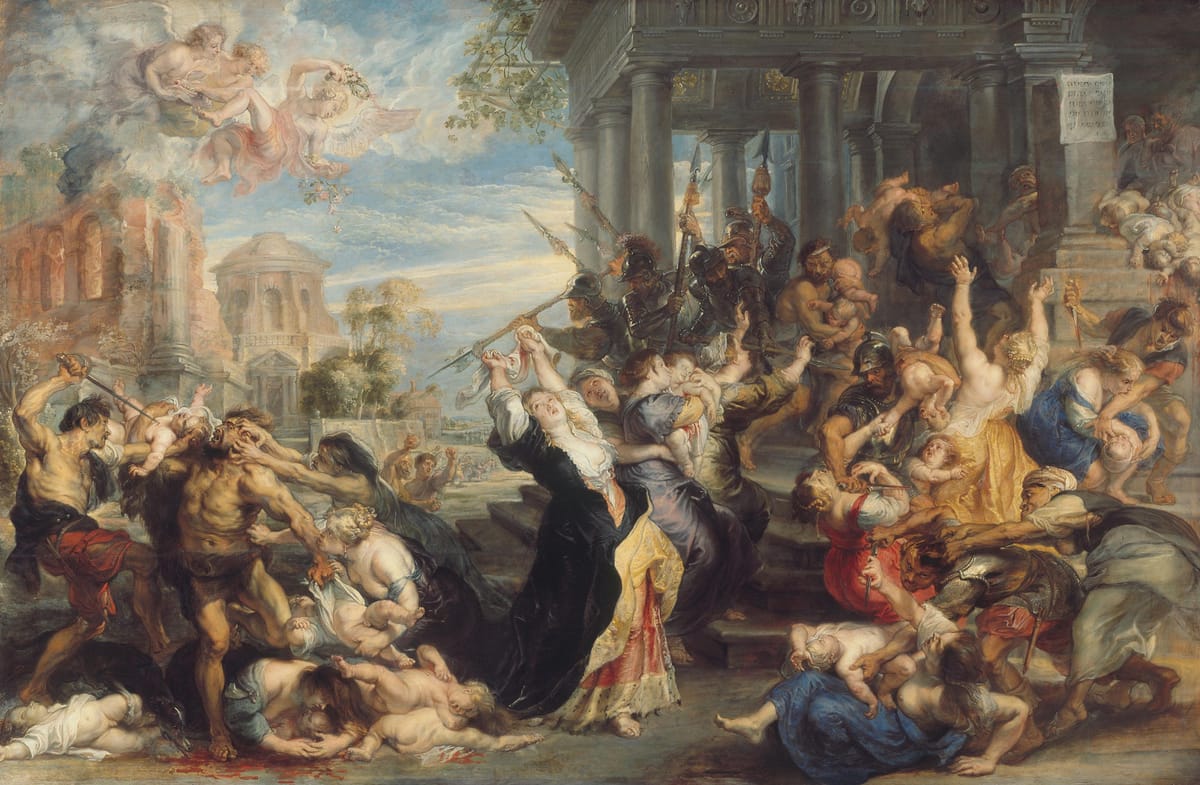Entreating Elders
Instead of fostering a culture wherein older men teach younger men the skills necessary to eclipse their elders in fighting for the Kingdom, the older men barred the gates of industry, commerce, and authority from the very men whom God intended as their replacements.

Children, obey your parents in the Lord: for this is right. Honour thy father and mother; (which is the first commandment with promise;) That it may be well with thee, and thou mayest live long on the earth. And, ye fathers, provoke not your children to wrath: but bring them up in the nurture and admonition of the Lord.
—Ephesians 6:1-4
Any Christian in the church today that has not noticed the animosity between elders and young men has not been paying attention. Whether it be in the self-aggrandizing jabs from old men against “factious men” in their congregation, or the now commonplace retort of “OK Boomer” from junior churchmen directed towards their superiors, the Western church is replete with examples of intergenerational strife between elders and juniors. Depending on the age bracket, it seems like the battle lines have already been drawn. Those old enough to have watched the moon landing live on television are told that they must be naturally opposed to those that aren’t, and vice versa.
This is an infernal lie that has inundated Western culture for decades. The most powerful forces in finance, media, popular culture, and politics have perpetuated this proposition ad nauseum. Growing up in the new millennium, I was bombarded with propaganda pieces poking fun at dopey fathers married to shrill busybody wives who just couldn’t leave behind their stuffy old ways and embrace the wisdom exhibited by their children. Only when those in authority acquiesced to the whims of their subordinates did the cast learn the true meaning of friendship, or some equally vapid cliché.
When I became a father, I realized what a wicked trick Satan has played on the world and the church. His minions had tricked young men into rejecting the authority of their forefathers, while at the same time creating in older men a subconscious fear of the younger generation writ large. Instead of fostering a culture wherein older men teach younger men the skills necessary to eclipse their elders in fighting for the Kingdom, the older men barred the gates of industry, commerce, and authority from the very men whom God intended as their replacements.
The alarm bells have been sounding for decades. Young men have, until recently, been leaving Western churches at an alarming rate. Solemn men have mourned this reality from the pulpit for just as long. Praise God that he is much more faithful to his people than those in charge of his people have been. All is not lost. There are practical steps that older men can, and must, take in order to come alongside the men who will replace them as the stewards of the world.
Without stalwart older men to be godly fathers, elders, and community leaders, Western civilization and the Western church will fall. Unless young men are trained to fill the positions of the men who currently occupy them, our churches and communities will continue to degenerate. In order to rebuff Satan’s attacks on Christ’s church, those men in seats of authority need to take a long, hard look in the mirror and realize that it is their responsibility to ensure that their legacy does not die with them. If we are to rebuild and reform Christendom, the war for the hearts of our elder men must be waged.
All of the benefits of being an older man in Christian community are wasted if older men do not take it upon themselves to embody the principles they preach. Whether it be at home, in church, or in society, those who are older must be the best possible example of all that which they wish to see in the world. In matters of faith, older men must strive to be the pinnacle of piety and holiness. In matters of the home, older men must be diligent to direct their household in righteousness and sound doctrine. In matters of business, older men must deal honestly and fairly with those they employ and are employed by. In matters of state, older men must fiercely defend the posterity that has been handed down to them by their forefathers. The day is drawing near when the elders of our people will be called to give an account for the inheritance that they have left to their posterity. This article seeks to convict and embolden the men who are in this position that they may dispense with it in a good and faithful manner.
“We make men without chests and expect of them virtue and enterprise. We laugh at honour and are shocked to find traitors in our midst. We castrate and bid the geldings be fruitful.”
—C.S. Lewis, The Abolition of Man
Men without chests, but with ample bellies, have become the stereotype of Christian elders in the past century, and not without warrant. Instead of disciplining their own bodies and souls, far too many elders attempt to bring the rod of God’s standard to bear on the backs of faithful men in the church. Young men disproportionately bear the brunt of this indiscretion. Their drive is chided as “toxic masculinity,” dynamism as “vainglory,” self-sacrifice as “LARPing,” and creativity as “woke-right propaganda.” Honorable men are slandered by men who demand honor, and dissent is written off as evidence that slanderers are “over the target.” Men who desire a nation for themselves and their progeny are condemned as unlovable kinists and misogynists who are certainly no fun at parties.
Older men in the church must not lose sight of the position that they have been bequeathed by their forefathers. Older Christian men are commanded by God to raise up their children in the way they should go. This task requires skillful application of the rod of discipline, as well as tender wielding of the crook of direction. Far too often elders in the church have been predisposed to the use of the crook as a rod, disciplining faithful sheep for pointing out (rightly) that there are greener pastures that have for too long lain ungrazed. Older men must not be afraid of young men who rise up with greater strength, greater fervor, and a grander vision for the future. The principal end of eldership in church and state is this: to mentor and mobilize men who will eclipse their forefathers in wisdom, stature, and favor with God and man.
Likewise, elders must be an example in all areas that a young man should hope to excel in. Physical fitness is the clearest outward evidence of the end to which an elder is leading his flock. No pastor, father, or businessman who seeks to corral young men towards godliness will be up to the task if he cannot corral his own sloth and appetite.
Shepherding is hard work and requires much more than academic understanding and pithy sermon quips. Elders must be strong and vigorous men both in mind and body. Otherwise, their legacy will be to field a regiment of weak and frail men who are expected to do battle against the dragons wreaking havoc in our Father’s world.
Elders must not neglect their studies, but they must engage richly with the writings of our Christian forefathers. When the young men in the assembly discover dusty tomes and theological treatises that contradict what their elders have taught, elders should be first to encourage the full understanding of those works. Scolding young men for drinking from the deep well of Christian historical teaching because of “problematic attitudes” contained within is a sure way to delegitimize the other works that elders would have them read instead. This is not to say that elders should not recommend more recent works. Rather, they should strive to show those works in context of the whole of Christian thought. And if in that pursuit elders realize that their mindset is in error, they must be the first to recant and reform. To dismiss those ideas that contradict the modern zeitgeist solely because they contradict it is to depart from the core motivating principles of the Reformation. There is no greater hypocrisy in Reformed Christendom today than is exhibited by elders who anathematize young men because they hold to the social or political opinions of those men who penned the very documents which define Reformed Christendom.
Alongside physical strength and academic vigor, elders must be committed to hospitality. Fellowship is serious business, and Christian men must be experts in the craft of administering opportunities for godly fellowship. Providing mentorship to young men means much more than recommending books for them to read (or dissuading them from reading others). Christian communities are incomplete without established elders who open their homes and their hearts to the young men whom they see every Sunday. All Christian men must strive to keep their house in order in such a way as to provide a home that is a welcome reprieve from the strife in the world, elders most of all.
Likewise, elders must also lead their families in godliness. The best assessment of an elder’s teaching is the fruit of that teaching borne by his wife and progeny. Far too many men consider their family to be a collection of ideological islands. This attitude takes root quickly and bears only wicked fruit. Men who neglect to take the definitive and final stance on matters of spiritual and ideological truth in the administration of their homes will surely reap more tares than wheat. When older men take the teaching of God’s Word at home seriously, the benefits are boundless. A godly home, filled with a godly family, is the most powerful asset that any elder can bring to bear in the war of the cosmos.
Strong, wise, and affable elders are a great bulwark against unrighteousness. Satan knows this well, which is why these character traits are under constant barrage. If the young men in the church have no elder to turn to, rest assured that God will raise men up to lead them in their stead. Men must be shepherded, and if elders note that other men are whisking away their flocks, there is a real possibility that they are able to do so due to abdication of the pasture’s guardian. Before blaming youthful exuberance and foolhardy demeanors amongst the youngsters, elders must first consider whether it was they who left the gate open. Further, they must consider the very real possibility that the grass actually is greener in the adjacent paddock. If that is the case, instead of raging against supposed supplanters, elders should learn that there is a time when they will be called to graciously leave their rod and crook at the fenceline and take their reprieve. The unfit man stubbornly holding onto a station he can no longer maintain is not wise, but greedy and foolish.
This reprieve should neither be self-serving nor premature. Reformed men should not seek to blindly overthrow their elders and install in their place a chorus of young counselors. We should not be hasty to call older men to abdicate their position based on age alone. However, older men should watch for those young men who demonstrate the aptitudes and attitudes necessary for leadership and train them up to lead. And, in the stations given by God where young men are called to lead, they should be encouraged and emboldened in their administration of those offices by their elders. When the time comes for a godly elder to take his leave, it should be with grace and joy in knowing that his tenure was effective to raise up a worthy successor.
The consequences of promoting men who exhibit “Company Man” attitudes have been disastrous regardless of age. Older men should not seek to cherry-pick younger men solely on their willingness to maintain the status quo. The godly standard of honoring one’s superior does not include being a “yes-man.” While the prevailing winds of society benefit these kinds of attitudes and behaviors, it is selfish and ungodly to perpetuate them in order to aggrandize one's legacy or pad one's pocketbook. Godly older men must not give in to the temptation of allowing young men to idolize them. No man is too old to make mistakes, and godly men must recognize that in themselves and guard against the younger men who champion their mistakes and blindly follow their example.
Above all, elders must realize that their authority is based upon a higher authority. No matter how many sermons one has preached, how many children one has raised, how many millions one has made, how many debates one has taken part in, or how many books one has written, all of man’s works will be measured against the perfect Standard. Pharisees like Saul dedicated decades of their lives to the study of God's word, after all, but when Stephen proclaimed Christ crucified, he was stoned for the blasphemy of speaking godly condemnation upon an erudite, educated, and damned establishment. Let us pray for elders who love young men who care about the church enough to disagree with them. May their hearts be soft enough to reform in the face of sound correction. May age and accolades nevermore be used to negate the errors and attitudes that wound Christendom’s sons.
To the younger men: we must not play into the other half of Satan's gambit. We must gladly receive godly corrections, no matter the age of the man correcting us. We must eagerly desire godly elders and encourage those who are faithful and true, as we strive to live according to the standards we want to see followed by our superiors. We cannot spend all our youth chiding our elders for their mistakes at the expense of neglecting the standards of holiness and wisdom that we desire to see our fathers embrace. Let us not waste the strength that God has given us as our glory. Let us not become complacent sycophants in order to attain comfortable positions. Let us strive to embody the song of the Psalmist who declared, “O God, thou hast taught me from my youth: and hitherto have I declared thy wondrous works. Now also when I am old and greyheaded, O God, forsake me not; until I have shewed thy strength unto this generation, and thy power to every one that is to come” (Ps. 71:17–18).
God will not be mocked, and the saints being persecuted by their own fathers and pastors will stand before him on judgment day shoulder to shoulder with those who were called to steward them. Let us strive to see our elders and juniors alike receive the same words from our Lord, “Well done, thou good and faithful servant: thou hast been faithful over a few things, I will make thee ruler over many things: enter thou into the joy of thy lord” (Matt. 25:21). May we strive together as Christian men, young and old, to live in such a way as to not fall under his condemnation:
Thou wicked and slothful servant, thou knewest that I reap where I sowed not, and gather where I have not strawed: thou oughtest therefore to have put my money to the exchangers, and then at my coming I should have received mine own with usury. Take therefore the talent from him, and give it unto him which hath ten talents. For unto every one that hath shall be given, and he shall have abundance: but from him that hath not shall be taken away even that which he hath. And cast ye the unprofitable servant into outer darkness: there shall be weeping and gnashing of teeth.
—Matthew 25:26–30





